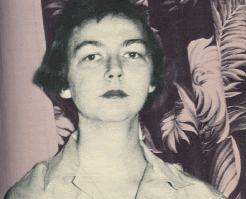
Following the publication of A Good Man is Hard to Find, Flannery O’Connor received a note from a young woman named Betty Hester telling her that God was the book’s central subject. Amid the flurries of reviews calling O’Connor’s book cruel and sarcastic, Hester’s letter was welcome reading. It ignited a nine-year friendship and a prolific correspondence. Faith and religion was their dominant focus. A devout Catholic, O’Connor even persuaded Hester to join the church, acting as her confirmation sponsor. Below, O’Connor discusses the merits of late-in-life baptisms and her early fights with angels.
To Betty Hester
17 January 1956
I’m never prepared for anything. I felt sure you were 7ft. tall and ash blonde and you turn out to be dark and shaped like a ginger beer bottle and I have been equally positive that you were a Pantheist in good standing with whatever they’re in good standing with and now you allow you’re as orthodox as I am if not more. More, I suppose, as baptism is something you choose and I had it thrust upon me. To my credit it can be said anyway that I never considered you unbaptized. There are the three kinds, of water, blood, and desire, and with the last I thought you as baptized as I am. So that may be the reason I a have nothing to say about this when I ought to say something. All voluntary baptisms are a miracle to me and stop my mouth as much as if I had just seen Lazarus walk out of the tomb. I suppose it’s because I know that it had to be given me before the age of reason, or I wouldn’t have used any reason to find it.
In any case I can’t climb down off the high powered defense reflex whateveritis. The fleas come with the dog as Mr. McG says. If you were Pius XII, my communications would still sound as if they came from a besieged defender of the faith. I know well enough that it is not a defense of faith, which don’t need it, but a defense of myself who does. The Church becomes part of your ego and gets messed in with your own impurity. It’s a situation I can’t handle myself so I wait for purgatory to do it for me. Anyway, I know it exists.
I frequently disagree with priests who get themselves printed in various places but generally it’s not with the contents but the tone. My mind is usually at ease, but my sensibilities seldom so. Smugness is the Great Catholic Sin. I find it in myself and don’t dislike it any less. One reason Guardini is a relief to read is that he has nothing of it. With a few exceptions the American clergy, when it takes to the pen, brings this particular sin with it in full force. […]
It’s a very pompous phrase—the accurate naming of the things of God—I’ll grant you. Suitable for a Thomist with that ox-like look. But then I said it was a basis. What I suppose I mean is an aim. Anyway, I don’t mean it’s an accomplishment. It’s only trying to see straight and it’s the least you can set yourself to do, the least you can ask for. You ask God to let you see straight and write straight. I read somewhere that the more you asked God, the impossible what you asked, the greater glory you were giving Him. This is something I don’t fail to practice, although not with the right motives.
I don’t want to be an angel but my relations with them have improved over a period of time. They weren’t always even speakable. I went to the Sisters to school for the first 6 years or so… at their hands I developed something the Freudians have not named—anti-angel aggression, call it. From 8 to 12 years it was my habit to seclude myself in a locked room every so often and with a fierce (and evil) face, whirl around in a circle with my fists knotted, socking the angel. This was the guardian angel with which the Sisters assured us we were all equipped. He never left you. My dislike of him was poisonous. I’m sure I even kicked at him and landed on the floor. You couldn’t hurt an angel but I would have been happy to know I had dirtied his feathers—I conceived of him in feathers. Anyway the Lord removed this fixation from me by His Merciful Kindness and I have not been troubled by it since. In fact I forgot that angels existed until a couple years ago the Catholic Worker sent me a card on which was printed a prayer to St. Raphael. It was some time before it dawned on me Raphael was an archangel, the guide of Tobias. The prayer had some imagery in it that I took over and put in “The Displaced Person”—the business about Mrs, Shortley looking on the frontiers of her true country. The prayers asks St. Raphael to guide us to the province of joy so that we may not be ignorant of the concerns of our true country. All this led me to find out eventually what angels were, or anyway what they’re not. And what they are not is a big comfort to me […]
From The Habit of Being. Edited by Sally Fitzgerald. New York: FSG, 1979.
FURTHER READING
The New Criterion looks back on O’Connor.
The Rumpus has an excellent article about Betty Hester.


